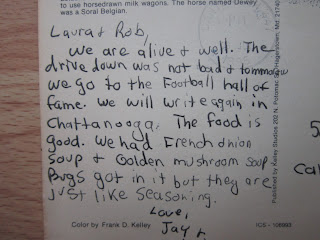1. It was free. Thanks, HoCoPoLitSo!
2. There was music by young composer and violinist Joshua Coyne.
3. RITA DOVE
Poetry Friday
Today's Poetry Friday round-up
is at Cathy's blog,
The selections she read at the event were beautiful. Some of the poems include multiple voices. They are funny, piercing in their portrayal of the society that celebrated Bridgetower, then erased him from history.
But what I really want to talk about is signed books. I did buy a copy of Sonata Mulattica last night and Rita Dove signed it.
 |
| Sonata Mulattica by Rita Dove |
Are these books a little more special than their unsigned shelf-mates?
I think so. A signed book is similar to a photograph. Every time I open the book and read the personalized dedication, I remember meeting the author and sharing a word or two. I remember asking poet Mark Doty to sign a book and wanting to hide in a giant hole when he pointed out that I'd handed him someone else's book by accident. I remember meeting children's poet Heidi Mordhorst, now a dear friend, for the first time.
Today, I'm presenting a gallery of dedications for you to enjoy. Following the photographs is a little found ode that I wrote. It combines titles of these signed books with words and phrases borrowed from the dedications.
 |
| The Song Shoots Out of My Mouth: A Celebration of Music by Jaime Adoff |
 |
| Pumpkin Butterfly: Poems from the Other Side of Nature by Heidi Mordhorst |
 |
| The East-West House: Noguchi's Childhood in Japan by Christy Hale |
 |
| I Am the Running Girl by Arnold Adoff |
 |
| She Had Some Horses by Joy Harjo |
And here is my found poem. Words I added are in bold. Everything else is strung together from the dedications and the book titles.
When You Sign My Book
by Laura Shovan
The song shoots
out of my mouth
with great
appreciation for everything:
Gr8 to meet you!!
Enjoy!! God bless!!
Looking forward to your next book!
(and thanks for the new horizons).
I am a pumpkin butterfly,
flying East-West in
a celebration
of word music.
I am the
running girl,
watching
with joy,
listening for your sonata.
Poems
journey like childhood ghosts
or horses
from the other
side of nature.
And, following poet Brenda Hillman's example, here are some drippings -- phrases from the titles and dedications that I wasn't able to weave into the poem.
The House: Noguchi’s in Japan
at SCBWI 3/6/10 Poems
Keep for
She Had Some
Some horses for your
Enjoy
Mulattica
I'd love to hear your thoughts on signed books and book signings. If you have a treasured signed book, or a memory about a book signing, please share in the comments.
I'd love to hear your thoughts on signed books and book signings. If you have a treasured signed book, or a memory about a book signing, please share in the comments.




.jpg)
.jpg)


















